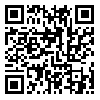Articles accepted at the time of publication
Back to the articles list |
Back to browse issues page
1- English Department, Damghan University, Damghan, Iran
2- Department of English and Linguistics, University of Kurdistan, Sanandaj, Iran ,jfathi13@yahoo.com
3- Department of English Language, School of Allied Medical Sciences, Shahid Beheshti University of Medical Sciences, Tehran
2- Department of English and Linguistics, University of Kurdistan, Sanandaj, Iran ,
3- Department of English Language, School of Allied Medical Sciences, Shahid Beheshti University of Medical Sciences, Tehran
Abstract: (1921 Views)
This study investigated the construct validity and measurement invariance of the Teacher Emotion Questionnaire to introduce a valid and reliable instrument for assessing English-as-a-foreign-language (EFL) teachers’ emotions inside the classroom. Second language (L2) teacher emotions have been largely neglected, despite the fact that Educational Psychology has long recognized and researched the role of teacher emotions in different aspects of teaching and learning. To bridge this gap, the current study had 208 Iranian EFL teachers in private language institutes fill out the Teacher Emotion Questionnaire (TEQ), which assessed six emotions teachers experience in their classroom, i.e., Joy, Pride, Love, Anger, Fatigue/Exhaustion, and Hopelessness. The preliminary analysis of the data showed that six items from the TEQ had a factor loading below the minimum recommended level of 0.3, meaning that they contributed to the total variance in the participants’ score less than expected. The collected data were then submitted to confirmatory factor analysis (CFA) for the purpose of construct validation and establishment of the factorial structure of the TEQ. The CFA results indicated that the hypothesized six-factor analysis had more favorable goodness-of-fit indices than both a one-factor structure and a two-factor structure (e.g., positive versus negative emotions). Multilevel CFA revealed that the tested six-factor structure of the TEQ was invariant across male and female EFL teachers. The implications for the use of TES in EFL teaching contexts are discussed, and some suggestions are proposed for further validation of the TEQ in language teaching contexts.
Keywords: Construct validation, Teacher Emotion Questionnaire, Confirmatory factor analysis, Fit indices, measurement invariance
Article Type: مقالات علمی پژوهشی |
Subject:
language teaching
Send email to the article author
| Rights and permissions | |
 |
This work is licensed under a Creative Commons Attribution-NonCommercial 4.0 International License. |







